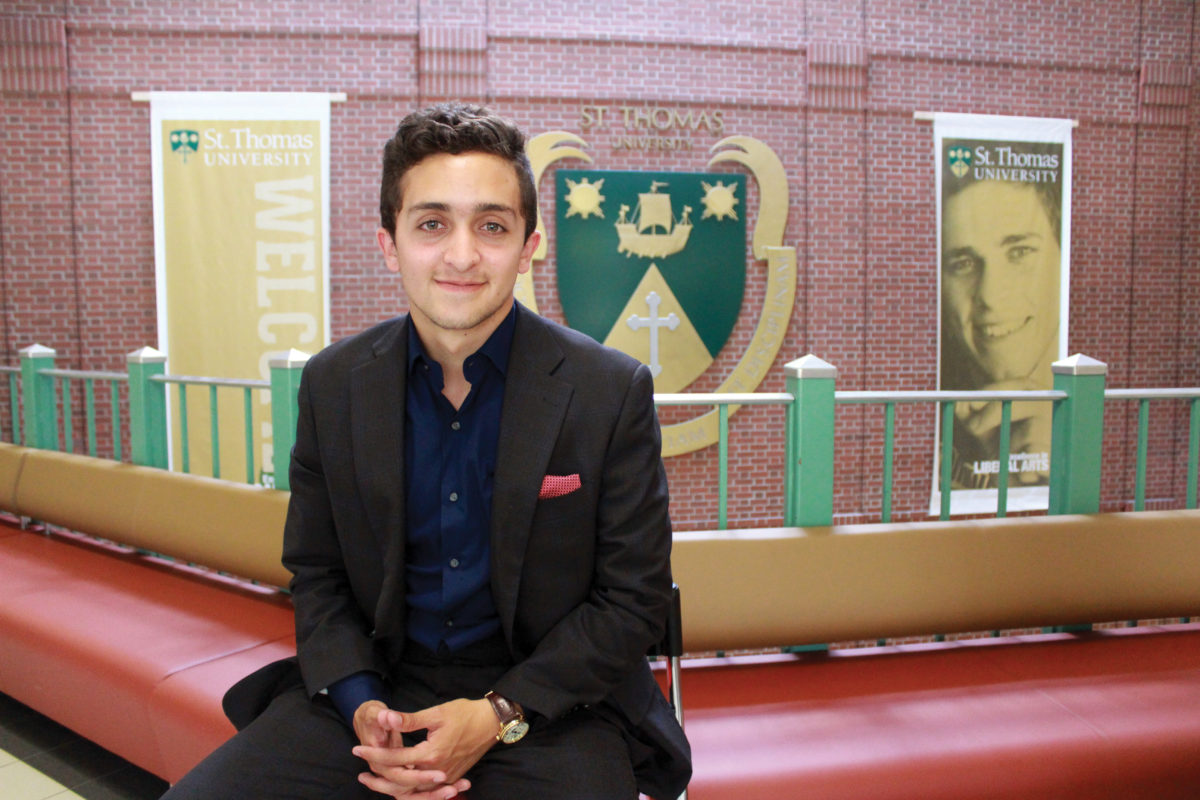 When Santiago Chavez was growing up, he was usually the shortest and newest kid in class. As the son of Ecuadorean diplomats, he was also, more often than not, a foreigner.
When Santiago Chavez was growing up, he was usually the shortest and newest kid in class. As the son of Ecuadorean diplomats, he was also, more often than not, a foreigner.
“But one thing that always made me friends everywhere was being a good student and being polite. Everywhere you would go just saying ‘hi’ to people, ‘bye’, holding a door, whatever, broke off any tension,” Chavez said.
As I tumble into James Dunn Hall 10 minutes late, disheveled and sweaty, I was greeted by STU’s Student Union president. He was wearing a perfectly put together suit and from what I could tell had taken the extra few minutes to help a friend. I apologize for being late but he waves it off. We go down to the basement level and sit at one of the tables and begin the interview. He’s got a soft-spoken quality to him. I feel like his antithesis – he’s got everything put together and I’ve managed to forget what year he came to St. Thomas. It’s okay; Chavez is overly gracious and forgiving. He assures me everyone makes a mistake, but I feel like that has suddenly come into question. There’s a certain gentleman’s quality about him. His politeness doesn’t feel fake. This guy is polite to the core.
Chavez spent most of his early childhood travelling: Belgium, Switzerland, United States, Venezuela. From this constant moving, Chavez’s politeness first took root.
His mother eventually left the job in support of her family and to pursue other interests, while his father continued his stressful job in politics.
“My dad is a very principled guy, and that sometimes causes trouble because there is collision between what he is supposed to do, what he is expected to do and what he wants to do,” Chavez said. Since first elected in 2006, Ecuador’s president, the left-leaning populist, Rafael Correa, established a close relationship with Venezuela’s late president Hugo Chavez and has consolidated the power of his position.
“It went from hard for some reasons, to harder for other reasons. That’s why my father would push me away from politics and things like that.”
Despite his warnings, Chavez is his father’s son.
“He passed down the similar interests, in the manner of the way we speak and personality and character. The way I behave in the office is largely a reflection of him.”
After Chavez’s older brother went to St. Thomas, Chavez saw how much his brother loved it and soon set off for Canada. But he now admits he had set an unfair standard Fredericton could never live up to.
“I was so comfortable in Ecuador, and I was like ‘wherever it is, I’ll be okay.’ But I didn’t acknowledge I was so well off in Ecuador – with my friends, my family and the freedom – that when I got here I compared everything to Ecuador. Of course it’s very different.”
The cold weather only heightened these thoughts.
“First semester I got really good grades. Aquinas program, loved it. Second semester, when winter came, worst grades I’ve ever had. With that came stress.”
“You’d always go back to your room in the middle of winter and think, ‘Yeah, it’s not Ecuador.’”
It was hard on his mother too who had been left alone now without her children.
“My mom, in Spanish, is what we call ‘chicken mother.’ She’s heavily emotionally invested in her children,” Chavez said. “One time I called her, and was like ‘Mom, I’m not feeling [Fredericton] too much.’ And she was like ‘Wanna come back?’ and I was like ‘No, you can’t tell me that because if you always tell me that if I have a hard time I can come back… like I can’t always be bailed out.”
During these times of doubt, Chavez first read Aristotle and found an affinity for the Ethics.
“I thought Aristotle sounded like he had everything figured out. His recipe for virtuous life. I tried to follow it and I drove myself crazy,” Chavez said. “I tried to do it for a while and I measured myself, and my life, and that also includes my community, on the basis of it.”
“Either, [the Ethics are] not realistic for anyone in modern day, or I wasn’t ready.”
Chavez eventually got used to the cold weather and the unfamiliar food and culture, largely because of meeting more friends and building a community he felt at home in.
“I got to the point where I could just let off steam and I thought, ‘There are two things I know have always been important to me but I haven’t recognized to the point I do now and that’s family and the fact one of the things I think people should drive themselves by is compassion and being nice to other people. I wasn’t as conscious before that these two things were such big priorities.”
That’s sort of the way Chavez wants to run his STUSU. As this interview has gone on, Chavez has done a little wave and flashed a smile to almost everyone who was walked done the stairs next to us. You can see how he has grown a larger and larger family and filled it with compassion.
“I’ve attended a couple sports games and practices because I think that’s something that’s missing. Every time I go I bring somebody new with me. It’s a lot about empowering people.”
He’s trying to reach out to people just like he needed people to reach out to him.
“The self-centered reason I got into politics is because I needed it.”
